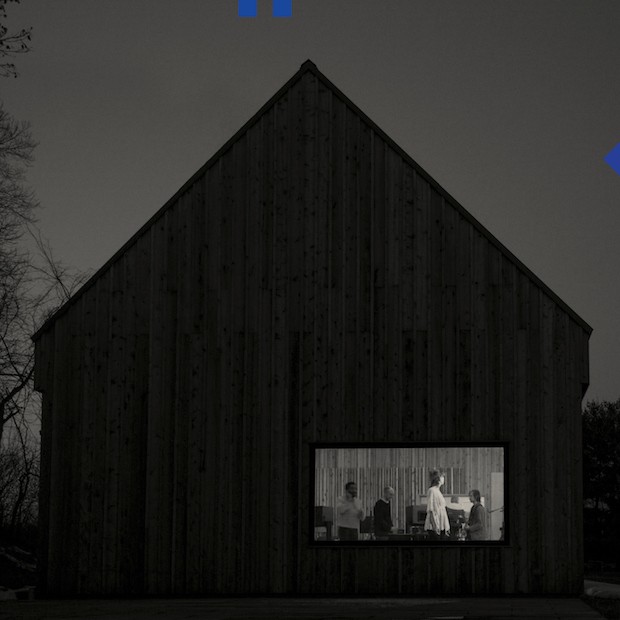Some bands can’t help but sound like a place.
Whether it is in guitars that sound like the Sunset Strip five minutes before trouble, harmonies that feel like a damp Pacific Northwest, or grooves that drip like the faucets in a dirty Delta bar, these acts always take you somewhere, avoiding the tourist traps and surrounding you with setting.
Another type of band is just as evocative, yet the places it occupies and pre-occupies exist within a body, not outside it.
These artists, typified by a band like Radiohead, sound like the scrambled thoughts of an anxious mind, the rhythms of a quickened pulse, the weight of life as it sits squarely within the chest. These interior settings are immediately recognizable to listeners who regularly visit them, often with reservations.
The National belongs to that second company of artists. The Brooklyn band’s songs sound like a mind turned inside-out, a soul yearning for relief — sometimes in screams, sometimes in sighs. Sleep Well Beast, The National’s seventh record, continues in that vein, yet accesses refreshingly acute angles on what might be its most beautiful work yet.
Album opener “Nobody Else Will Be There” joins a gentle pulse and plaintive piano. Its atmospheric rock feels like a modern take on Peter Gabriel’s “Red Rain” until frontman Matt Berninger’s baritone enters the mix to remind you who you’re dealing with. “Day I Die,” another backlit standout, follows. Drummer Bryan Devendorf thunders along while the band around him brings the electric lightning to the storm. Berninger still is coping with existential matters, but clearly he has taken a few steps forward.
He delivers a compelling bridge lyric: “Let’s just get high enough to see our problems / Let’s just get high enough to see our fathers’ houses.” Set this against the sentiments of one of The National’s signature songs, “Afraid of Everyone,” from 2010’s High Violet; There he sank into the mantra “I don’t have the drugs to sort it out.” By comparison, it sounds like Berninger is doing more than just getting by or high with a little help from his friends.
From there, The National deepens and widens its sound. Rather than reside in a rut or attempt to jolt itself into mid-career reinvention, the band shifts by degrees, surprising faithful listeners by finding very different ways to stave off the same problem. The band inches further and further from orthodoxy on tunes like “Walk it Back” and “I’ll Still Destroy You.” The former uses electronic sounds in a stimulating way, creating a sort of pulsating sonic light. The latter is more percussive, leaning into the new-music interests of guitarists Aaron and Bryce Dessner, achieving a sort of modal, exotic peal.
The band makes use of a more standard deviation on single “The System Only Sleeps in Darkness,” wearing the clothes of a more straight-ahead rock band. Glitchy riffing gives way to a proper guitar solo, a sort of novelty on the band’s records. The track does start with a few bars of madrigal cooing, so it’s not like The National suddenly have sacrificed to the gods of stadium rock.
Late in the tracklist, the band lands a 1-2 punch that is as quietly devastating as anything it has ever recorded. “Guilty Party” is the sound of trying to connect. Over booming drum sounds, the band’s jagged instrumentals even resemble the static of trying to dial up and dial in.
The song gives way to “Carin at the Liquor Store,” one of a few songs to grow from waltzing piano. Here the sound of the instrument contains both shadow and light. Both songs have the power to cut deep; stacked together, the sweet ache is unavoidable.
None of this — Berninger’s sad-eyed ecstasies, the Dessner Brothers’ cinematic visions — works without Bryan Devendorf’s drumming. One of the most reliable, underrated players of his generation, Devendorf truly provides the band’s heartbeat, whether in a melancholy waltz meter or a desperate crash of rock and roll.
The only thing keeping “Sleep Well Beast” from contending for the class of the band’s catalog is middling rocker “Turtleneck.” The National has proved it can growl and thrash when it gets the itch — “Mr. November” is the band at its loudest and best. The ill-conceived “Turtleneck,” however, comes up short on both style and substance.
It seems ridiculous to cast The National as some sort of rock oracle, but in 2017 it seems the rest of us are just now catching up to the sort of low-grade paranoia and restlessness the band’s songs have incarnated. Here it taps into even more shades of tension. The National wrestles with the personal, with needing landmarks, even crumbling ones, to find your way in the world. Weather patterns, fuzzy memories — these things anchor Berninger’s lyrics and help him make sense of things.
They wriggle around in the grip of the political, questioning how to act for the common good when you’re barely keeping your own house in order. The songs here seem to ask “How do you prepare for the end of the world when you just keep coming to the end of your rope?”
The band’s inward gaze still is a welcome one, even now. In the work of lesser bands, it might sound self-involved, too precious for this moment. Not so with The National. On Sleep Well Beast, the band continues to map out, then walk carefully into the beautiful wilds of the human heart. If we can’t wrestle with and know ourselves, how will we ever honestly deal with someone else?
Berninger and his bandmates offer up lullabies to soothe the savage within, soaking the heart in wine and softening it to exist in a world bigger than itself.


